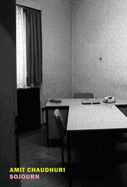
Amit Chaudhuri--novelist, poet, essayist, musician--dexterously expands the quotidian into philosophical, sociopolitical and existential ruminations in Sojourn, a sparse narrative with undeniably dense resonance. An unnamed Indian writer arrives in Berlin for a four-month university residency. He's befriended, then abandoned, by a Deutsche Welle journalist whose emigration as a Bengali refugee was sponsored in 1977 by Günter Grass. The writer teaches a class, drinks and dines with a few colleagues, and has a romantic relationship. Despite this being his second visit to Berlin, he remains a stranger in a strange land, navigating disconcerting landscapes that are both real and imagined.
Chaudhuri again proves his expertise with sly, indirect reveals, such as the novel's setting. Readers will know the year--"it was fifteen years since the wall had fallen"--and that the residency is at the Freie Universität, founded in 1948: "The university had come up in the fifties." The protagonist's promised spacious housing drolly confirms the prestige of his Böll Professor residency: he now sits on the same toilet used by Nobel Prize winner Kenzaburō Ōe, a former guest. "I felt a kind of empathy and embarrassment... this is what it comes back to: our relief at amenities."
Once more, Chaudhuri transforms unfamiliar geography into an intriguing character. He highlighted Bombay in Friend of My Youth and London in Odysseus Abroad; here, he memorializes a reunited Berlin of diverse neighborhoods and ethnic enclaves, of lingering divisions of what was once East and West, of streets with certain reputations and unsafe areas where neo-Nazis roam. As an extraordinarily keen observer of the ordinary, Chaudhuri offers absorbing fiction adroitly parsed from penetrating truths. --Terry Hong, Smithsonian BookDragon

